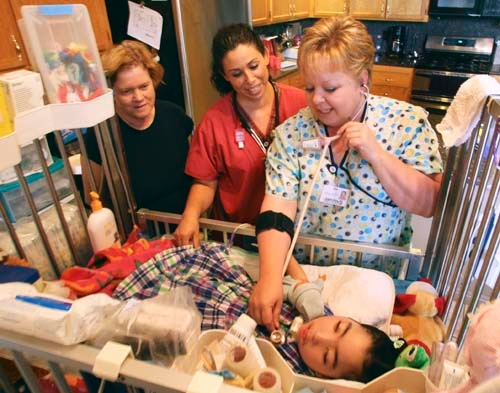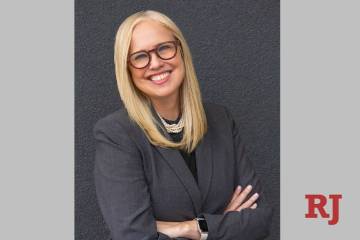Pediatric hospice care brings comfort to afflicted, families
So she won't be left alone, pretty Ashley spends much of her day on the edge of the home's busy kitchen, lying quietly in the crib that is likely to be her death bed. Here, her adoptive parents, Bill and Judy Himel, and sister Tammy compliment her on her new plaid dress, eat breakfast and talk about work and school and a rainy day in the desert.
A nephew, Matthew, toddles around giggling as the family's black Labrador, Bella, gives him a sniff with a wet nose.
Ashley, bless her heart, doesn't respond to the scene that smacks of a Norman Rockwell painting.
She can't.
Her biological mother's methamphetamine addiction led to a nightmarish childbirth that killed the mother and deprived Ashley's brain of oxygen. She is blind, deaf and unable to breathe on her own. She has never sat up, or rolled over, or uttered a word. Movement, other than with her eyes, is largely limited to frightening seizures, sometimes hundreds a day. There's a feeding tube in her stomach.
That she has lived until age 5 probably qualifies as a miracle. Two years ago doctors said she had six months to live.
On Wednesday, two registered nurses from the Nathan Adelson pediatric hospice program, Juliet Aoun and Angela Berg, made a weekly visit to see Ashley. They're there to support the Himels and to help keep Ashley as comfortable as possible. They ensure the equipment that keeps her alive works properly.
Hospice care offers sophisticated methods of pain and symptom control, rather than curative treatment.
"Pediatric hospice is one of the best things that's happened in Las Vegas," Judy Himel said. "They do everything they can to ensure that a child's quality of life at the end is as good as it can be. And they help me with needs I didn't know I even had. More parents who are in this situation need to take advantage of it."
The Adelson program works with about 20 dying children and their families every day, in addition to nearly 400 adult patients, doing everything possible to keep a child in the loving comfort of home instead of an impersonal hospital.
Private insurance and Medicaid cover the cost for many; the uninsured benefit from donations to the Nathan Adelson Hospice Foundation.
It was around 8:30 a.m. Wednesday when Aoun and Berg arrived at the Himel home in northwest Las Vegas. Bill had left for his electrical contracting job and Tammy was off with her own son, Matthew. Judy stood alone at Ashley's crib, gently rubbing the little girl's leg.
Berg, the pediatric program manager, believes she knows why Ashley is still alive: love.
"They had gotten Ashley as a foster child not long after she was born," Berg said. "She was referred to as 'baby girl.' They knew she was going to die. And Bill Himel couldn't stand the thought of her dying without a name. So they adopted her and called her Ashley. They are very special folks."
Although in recent years Nathan Adelson Hospice informally expanded its program to work with dying children, it wasn't until last year, with Berg's help, that Las Vegas pediatrician Dr. Kathleen Gates formally got the program running.
"It's important that we work with parents to make sure children with limited life spans have the best quality of life possible near the end," Gates said. "They may spend time in an emergency room that is painful, where they feel lonely and vulnerable, and it doesn't improve their life span or quality of life."
Each year, Gates pointed out, about 55,000 children in the United States die, many of them from the kind of lingering birth defects Ashley suffers from. Researchers have found that as few as 1 percent of those who could benefit from pediatric hospice care do so.
Gates said Las Vegas is one of only a dozen cities with pediatric hospice programs.
Until about 12 years ago, infants and youth have been largely left out of the debate over how to improve care at the end of life.
In a 2000 report in the New England Journal of Medicine on childhood cancer deaths, researchers said they found that only 27 percent got relief from pain and only 10 percent were helped to control nausea, vomiting or constipation.
Judy Himel said she and her husband had a "terrible experience" when their 6-year-old child, Phillip, died in a Las Vegas hospital in the 1990s.
"It was very stressful for everyone in our family," she said. "There were shift changes and nobody seemed to care about our son. And they wanted me to sign something that meant they weren't going to deal with his pain. At the end, we were practically at war with the hospital."
Gates noted the hospice program is limited to working with children who are judged by medical professionals to have a life expectancy of six months or less, and where parents agree to forgo life-prolonging treatment.
Often, parents are understandably unwilling to relinquish treatments for kids. The death of a child is so unthinkable that painful treatment may continue even when medical professionals know that it is fruitless. That's why Berg said the new health reform bill signed into law by President Barack Obama should help parents. Starting in 2013, children enrolled in Medicaid or the Children's Health Insurance Program may receive both hospice and curative care.
Berg said there are misconceptions about hospice care, and some people believe it means not feeding a patient or denying all medical care.
Nothing could be further from the truth, she said.
If a child improves during hospice care -- which sometimes happens because childhood illnesses are more difficult to predict -- the child returns to a regular medical program.
"With Ashley, we had hoped that she would progress more normally than doctors predicted," Judy Himel said. "Sometimes they're wrong. But in Ashley's case, they weren't."
Using Ashley and the Himels as an example, Berg pointed out that doctors and nurses are available 24-7 to help with issues that arise from pain, infections or feeding. No longer is there a need for agonizing trips to the emergency room that scare Ashley and force Bill Himel to miss work.
The hospice team coordinates with nursing Ashley receives through Medicaid. Social workers and chaplains help the family cope with stress and grief, and offer counseling that can continue after Ashley's death. When the family must travel Ashley is kept under medical supervision at the Adelson Hospice in-patient center.
Gates said the seizures have so weakened Ashley that she will soon face cardiac or respiratory failure. The Himels appropriately decided against heroic medical intervention for those conditions, Gates said, because her condition is not reversible.
"She is in a persistent vegetative state," Gates said. "She'll never be able to do anything other then keep her eyes open. She'll never get better or walk or talk. Most children in her condition pass away within six to 36 months. The Himels don't want to see her go through any more pain."
Among medical and social service professionals, the Himels are known for embracing some of the most challenging, medically fragile children in Nevada's foster care system, about 30 girls and boys in all. They've helped them through open-heart surgeries and grave illnesses. Their adoption of Brittany Bergeron, paralyzed in 2003 after her spine was severed in a brutal knife attack, drew public attention.
The parents of four boys, they never planned on fostering special needs children.
It all began, Bill Himel said, because his wife wanted a girl. When they couldn't adopt through local agencies, they turned to foster care, eventually adopting Tammy when she was 4.
"Then we got a call asking if we would take a special needs child," Bill Himel said. "We said OK because it seemed like the right thing to do. Nobody wanted to help these kids. But if anybody would have told me that we would have ended up with six at one time, I would have said they were crazy."
The Himels acknowledge their work has taken an emotional and physical toll.
Judy Himel, 60, needs two artificial knees; carrying children to the bathtub wore hers out.
"To have a child that you love die -- it's hard," said Bill Himel, 61.
After Ashley dies, the couple plans to devote more time to spoiling their grandchildren. They wish the day will come when all parents are spared the death of a dying child.
But until that day comes, they pray that moms and dads will consider pediatric hospice.
"It's too hard to go through it all alone," Judy Himel said. "When you can have people spare your child from unnecessary suffering, you find that somehow you can bear your own suffering."
Contact reporter Paul Harasim at
pharasim@reviewjournal.com or 702-387-2908.
To commemorate National Hospice Month in November, Nathan Adelson Hospice will hold its annual open house from 5 to 7 p.m. on Tuesday, Nov. 9, at the nonprofit organization's campus at 4141 Swenson St., off Flamingo Road.


























